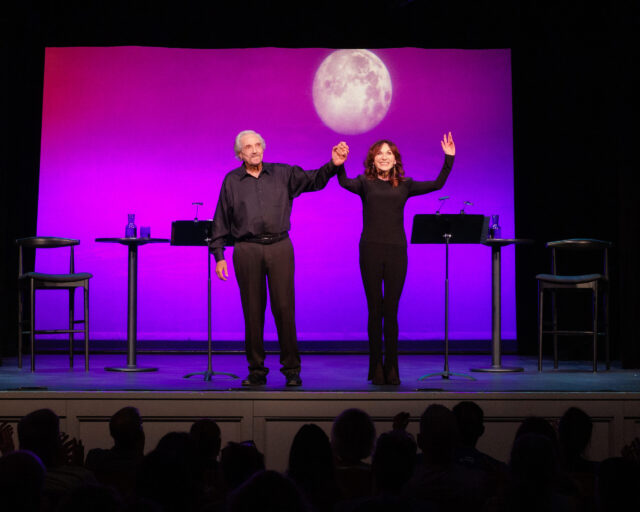
Hal Linden and Marilu Henner play Adam and Eve in new play at Sheen Center (photo by Paul Aphisit)
THE JOURNALS OF ADAM AND EVE
Loreto Theater, the Sheen Center for Thought & Culture
18 Bleecker St. at Elizabeth St.
Wednesday – Sunday through July 28, $39-$99
212-925-2812
www.sheencenter.org
In September 2022, nine-time Emmy-winning writer and producer Ed. Weinberger presented Two Jews, Talking at the Theatre at St. Clement’s, a two-character play in which television icons Hal Linden and Bernie Kopell played a pair of old Jewish men, first in the desert escaping slavery in Egypt, then sitting on a park bench, complaining about the state of the modern world.
Weinberger has followed that up with The Journals of Adam and Eve at the Sheen Center, a two-character play in which television icons Linden and Marilu Henner portray the planet’s first couple. The ninety-minute show is an adaptation of two short stories written by Mark Twain late in his career, 1904’s “Extracts from Adam’s Diary” and 1906’s “Eve’s Diary,” hilariously retold in the style of Borscht Belt comedians (and with a nod to John Milton’s Paradise Lost).
Although it is a staged reading with the actors at music stands, they know most of the lines, allowing them to gesticulate, whether speaking to the audience or to each other. They do regularly refer to the script, but only to pick up a word or phrase. Behind them, a projection of the sky turns from blue skies to clouds to the sun and the moon.
“Much to my amazement, I was born a full-grown man. How old exactly I never knew,” Adam says at the beginning. “But I was made on the sixth day after G-d created everything else in the world. I like to think of myself as G-d’s ‘big finish.’ After me, He rested.”
Discussing being the only man on Earth, Adam explains, “My first day was one damn thing after another. Figuring out what was edible and what was not. Which fruit to eat as is and which fruit I had to open or peel took serious concentration. My first banana almost choked me to death.” He discovers a pleasing herb that gives him the munchies, realizes that the figure looking back at him in a brook is himself, and wonders what the two dangling objects between his legs are for.
He is tasked with naming everything, but he fails miserably. He asks for an assistant, and G-d gives him Eve. “Now, there have been those — poets mostly — who have described our first meeting as ‘love at first sight.’ Nothing could be further from the truth,” he says. Eve responds, “You can say that again.” The gender wars have begun.
Eve is not so willing to accept G-d’s word as sacrosanct; she doesn’t believe that she was made from Adam’s rib, and she refuses to be Adam’s inferior. She declares, “Well, it just so happens that this living thing that ‘moveth’ is not one of your birds, fishes, or any other animal you have dominion over. So maybe you and this G-d ought to have another little talk about who is whoest and what is whateth.”
Eve shows an immediate talent for doling out names, starting with herself, as she recognizes the beauty of the Garden of Eden, but she also wonders what those two dangling objects between Adam’s legs are for. When Adam takes her to the brook, she sees her reflection and opines, “I must do something about my hair,” then asks Adam, “You think this makes me look fat?” In the skillful hands of Linden and Henner, these old jokes still elicit laughter. (Oddly, the joke that fell the flattest is a retread from Two Jews, Talking, where it fell flat as well.)
Weinberger details their initial sexual encounter, which is both romantic and humorous as it explores classic tropes. “Was it as good for you as it was for me?” Adam asks. Eve replies, “Better,” then tells the audience, “I lied.”
But their idyllic existence is turned upside down after Eve is lured by a snake to take a bite of an apple from the Tree of Knowledge, leading to Adam and Eve’s exile from the Garden of Eden. They must make a new life for themselves, experiencing guilt and shame, fighting like husbands and wives do, raising two boys, Cain and Abel, and learning to fear death. But amid it all, Adam tells the world’s first joke.
Director Amy Anders Corcoran (Christmas in Connecticut, Unexpected Joy) gives plenty of space for Bronx-born ninety-three-year-old Tony and Emmy winner Linden (Barney Miller, The Rothschilds) and Chicago-born seventy-two-year-old Henner (Taxi, Madwomen of the West, Gettin’ the Band Back Together) to strut their stuff, delighting in the words of Philly-born seventy-eight-year-old Weinberger (The Mary Tyler Moore Show, Taxi, The Cosby Show).
Linden, in casual gray slacks and a brown shirt that probably came from his closet, and Henner, in dazzling form-fitting black spandex, have a lovely camaraderie. (In the Los Angeles version of the play earlier this year, two-time Emmy winner Sally Struthers was Eve.) You can feel their warmth as Adam and Eve poke fun at each other, argue, and make love. Their relationship echoes a battle of the sexes that has been going on since, well, creation, especially as depicted in television sitcoms, from Ralph and Alice and Lucy and Ricky to Sam and Diane and Homer and Marge.
Even though the play is at the Sheen Center, a venue “where art and spirituality meet” — the program features a welcome that includes Bible verses — it does not proselytize. Instead, it is a very funny comic look at the ups and downs of life on Earth between men and women, asking eternal questions while (barely) skirting clichés and, most important, making us all laugh, at Adam and Eve and ourselves.
[Mark Rifkin is a Brooklyn-born, Manhattan-based writer and editor; you can follow him on Substack here.]